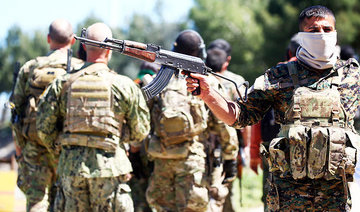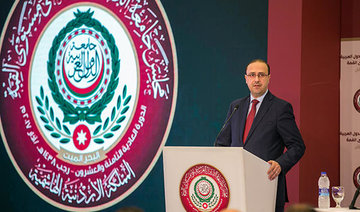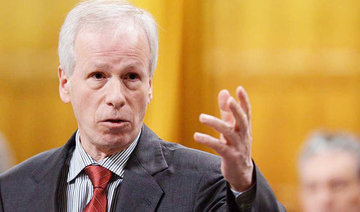ANKARA: Diplomatic tensions between Turkey and Israel have resurfaced after President Recep Tayyip Erdogan on Monday described the latter’s policy toward Palestinians as “racist.”
Israel summoned the Turkish ambassador after the remarks made by Erdogan during a conference about promoting economic development in Palestine.
Erdogan criticized Israeli policy toward Palestinians as “discriminatory,” and underlined that permanent peace in the Middle East will only be possible after establishing a fully sovereign and independent Palestinian state, with East Jerusalem as its capital.
Each day that Jerusalem remains under “occupation” is an insult, Erdogan said, calling on Muslims to stand up for Palestinian rights. He also associated Israeli actions against Palestinians with apartheid practices in South Africa.
The strongly-worded statements came less than a year after a normalization deal between the two countries, including the restoration of diplomatic ties at ambassadorial level, following a serious crisis after 10 activists were killed in the 2010 Israeli raid on the Gaza flotilla.
Erdogan also criticized a recent bill in the Israeli parliament to ban the use of loudspeakers for the Muslim call to prayer late at night and early in the morning.
“If you have faith in your religion, why are you afraid of the call to prayer?” he said. “God willing, we will never allow the silencing of azan (call to prayers) in the skies of Jerusalem.”
Israel summoned Turkey’s ambassador to the Ministry of Foreign Affairs following Erdogan’s statement. Ministry Spokesman Emmanuel Nahshon quickly released a statement pointing the finger at Turkey.
“Those who systematically violate human rights in their own country shouldn’t preach morality to the region’s only true democracy,” the statement said.
“Israel consistently protects total freedom of worship for Jews, Muslims, Christians, and will continue to do so despite baseless smears against it.”
Israel’s Knesset Speaker Yuli Edelstein also called the Turkish president an “enemy” of Israel despite the reconciliation between the two countries.
Analysts interviewed by Arab News said such statements will make it difficult to rebuild the mutual trust between the two countries after years of diplomatic crisis.
Nimrod Goren, head of Mitvim — The Israeli Institute for Regional Foreign Policies — said Erdogan’s critical statements come at a time of positive momentum between Israel and Turkey.
“The exchange of ambassadors led to increased engagement between the countries over the last several months. Cooperation between officials, academics, civil society institutions and cultural actors has been on the rise. Erdogan’s statements do not seem to reflect a change of national interests,” Goren told Arab News.
According to Goren, Turkey and Israel still benefit from improving relations, and do not want to step back. However, “even if the countries will manage to focus on constructive practical actions and to contain the current negative statements, Erdogan’s words have negative consequences,” he added.
Goren noted that the ability to convey messages about the peace process in a constructive manner is vital.
“Some Arab leaders are currently finding the way to do so. Unfortunately, this wasn’t the case with Erdogan’s recent statements,” said Goren.
Selin Nasi, a doctoral researcher on Turkey-Israel relations from Bogazici University in Istanbul, said Erdogan’s words were mainly for domestic consumption.
“President Erdogan’s criticism of Israel does not mark a shift in policy, yet it seems to serve… to mobilize domestic support around the Palestinian issue just before the Nakba Day commemorated a day after Israel’s Independence (Day) on May 14, while presenting Turkey as a regional power once more by acting as the sole protector of Palestinians,” Nasi told Arab News.
Given Turkey and Israel’s broader regional interests — such as energy cooperation, fighting terrorism and balancing against Iran — it is unlikely they will abandon the reconciliation deal, Nasi said.
“Even before the normalization deal, President Erdogan’s constant bashing of Israel was a critical point, which the Israeli government strongly complained about and sought reassurances that would never happen again in the aftermath of the deal,” she said.
“However, this recent diplomatic spat will unfortunately and inevitably have a negative impact on (the) normalization process and hinder efforts to rebuild trust.”






























